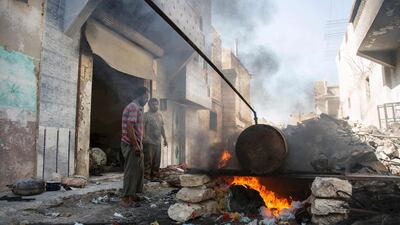Aleppo // In a destroyed building in Aleppo, neighbours Abu Ahmed and Mohammed Ibrahim rummaged desperately through rubble and debris in search of scraps of plastic to turn into fuel.
Residents of the rebel-held eastern districts of the city have struggled to keep their cars running or their electricity on since government forces first besieged their neighbourhoods this summer.
Fierce clashes south of Aleppo damaged the only power plant that served eastern parts of the city, leaving 250,000 residents without electricity since July.
“There’s no more fuel on the market, no heating oil, no petrol, no gas,” said Abu Ahmed, 40. “So we’ve decided to turn to alternatives.”
Plastic is used as the raw material in a dangerous and primitive process to extract fuel to run electricity generators.
In their native Sakhur district, Abu Ahmed and Mr Ibrahim packed plastic objects into black barrels, which were then sealed and heated on a wooden fire.
When the plastic melts it produces a gas that is piped and cooled, resulting in a yellow liquid used as diesel.
“We found out about this by looking on the internet and seeing how residents of Ghouta produce diesel, so we are copying them,” said Abu Ahmed, referring to another rebel-controlled and besieged area near Damascus.
Food and fuel shortages have combined to make life a daily grind for residents of Aleppo, where many districts have to survive on three hours of generator-powered electricity a day – and some make do with none at all.
The price of the rare fuel supplies that reach Aleppo has rocketed to 1,200 Syrian pounds (about Dh8.50 at current black market exchange rates) for a litre of diesel, compared with 350 pounds before the blockade.
Residents have been awaiting deliveries of food and fuel since a ceasefire came into force on September 12, but no aid has entered the city for a week.
Forty UN trucks carrying food aid – enough to feed 80,000 people for one month – remained stuck on Syria’s border with Turkey on Sunday.
Mustafa Marjan, a 30-year-old resident of the Zabadiya district, was not impressed by the truce.
“I don’t only want the bombs to stop – we want vegetables and fuel to be allowed in!” he bellowed.
“How can we cook and feed our children if there’s no fuel on the market?”
Most of the fuel produced from plastic make goes to feed generators used by residents to pump water from wells.
“We’re only extracting between 70 and 80 litres a day,” said Abu Ahmed.
“Our goal is not to make a profit but to serve our neighbourhood, by giving people a degree of self-sufficiency,” said his neighbour, Mr Ibrahim.
Days later, Abu Ahmed and one of his colleagues burned to death when a barrel exploded during the melting process.
* Agence France-Presse

